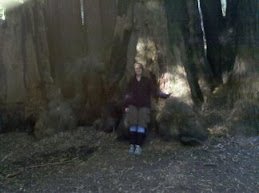This has been a busy work week for me. I am only in my third week of work at my new part time job at the Butte Environmental Council (BEC). I now work there mornings 9am-1pm and at Jen’s daycare from 1:30 or 2 to 5:30. The change is helping my income flow since the BEC job pays more, and yet I also get to keep doing the daycare work which is important to me. The bonus is that I get to get back to doing environmental activism work again.
Fall in Chico means that it is cold at night, occasionally enough for frost, and chilly (in the fifties) in the morning, but the afternoons are still shorts weather (eighties and sometimes ninty). There are splashes of reds and yellows amid the late changing trees and evergreens as I bike through my neighborhood and downtown to my morning job. The many different political signs on in the yards also add to the colors. It is clear that my neighborhood is more of an Obama place, but not exclusively.
I did an internship with BEC back in 1993 and I have kept in touch with the Executive Director, Barbara. She is a no-nonsense kind of person and can be short and brusk as a boss, but I also found her to be fair. She gave out reprimands only when deserved and also gave out praise when deserved. So far I have found her to be the same and I get along with her well. There is some organizational cultural roughness that I will have to navigate, but that is true every where. The people are all committed to a good cause.
Mostly I am doing office restructuring stuff right now—moving boxes, sorting stuff, and finding places for things. I am also doing some of the “running an office tasks” like answering phones, running errands, and filing. Barbara has given me several small projects and just this week started me and the bookkeeper on the large project of working on the membership database. That will be challenging because of the software stuff, but it will be a good challenging. As I learn more about the particular environmental issues, I will be helping Barbara with that side of the job as well. At least, that is the idea. However, it is a small nonprofit and there are always too many things to do and too little time and people to do it with, so who knows how things will evolve!
I have not settled into a new groove at the daycare yet. I arrive just at the end of lunch, as naps are starting, and as the morning person is leaving. Lately the house has been pretty much a wreck when I get there and I bounce back and forth between scrambling to get the house in better shape and keeping the children out of Jen’s hair as she is giving out naps. Suddenly it is 5pm and I haven’t even seen the garden or the kittens…
This week was crazier than usual. Jen spent the week slowly getting everything together that she needed for her horse camping trip to the coast. There were multiple problems with the trailer, cleaning up all her gear, packing, planning what clothes to pack, what food to bring, what camping gears was needed and checking it all. She was able to do a lot of this during the day when she had multiple coverage, but things always come up at the daycare, things that make you veer off course, and getting back is not always very easy. I stayed late most nights this week, which meant 12 hour days. We need the money so that was good, but Friday night I was exhausted.
I am watching Jen’s mini-farm this weekend and so had lots to do once the daycare was closed. Mom called to see if I wanted to go to dinner with them, a great offer at the end of a long, tiring week. It was dark when I got back and I had to put the chickens to bed. This involves snatching the two small oak tree sleepers and carrying them into the hen house. Last night they were higher than usual so I had to drag a chair over to get at them. I locked them all in, fed the four dogs and the ten cats, and then went home to pack an overnight bag and my laptop. I had invited Brad to join me, but he got the flu that has been going around and didn’t want to leave home.
I was in bed and asleep by 9:30 and I slept until almost 8am. I was very tired!
It is a glorious morning! Sunny and not too chill. Chester the pony and Asolly are both crying for Zyphr who is horse camping with Jen. Their whinnies are very sad. The kittens have all scattered to play outside except for Ember who is sleeping at the foot of the bed with Daisy (one of the dogs). I am waiting for Jessa to drop Jen’s daughter Desi off. Jessa had her last night and I will be watching her and the farm until tomorrow morning. Tomorrow Jessa will have Desi again and Brad and I will drive down to San Francisco to see Tim who is visiting.
Thus ends another busy week!
Fall in Chico means that it is cold at night, occasionally enough for frost, and chilly (in the fifties) in the morning, but the afternoons are still shorts weather (eighties and sometimes ninty). There are splashes of reds and yellows amid the late changing trees and evergreens as I bike through my neighborhood and downtown to my morning job. The many different political signs on in the yards also add to the colors. It is clear that my neighborhood is more of an Obama place, but not exclusively.
I did an internship with BEC back in 1993 and I have kept in touch with the Executive Director, Barbara. She is a no-nonsense kind of person and can be short and brusk as a boss, but I also found her to be fair. She gave out reprimands only when deserved and also gave out praise when deserved. So far I have found her to be the same and I get along with her well. There is some organizational cultural roughness that I will have to navigate, but that is true every where. The people are all committed to a good cause.
Mostly I am doing office restructuring stuff right now—moving boxes, sorting stuff, and finding places for things. I am also doing some of the “running an office tasks” like answering phones, running errands, and filing. Barbara has given me several small projects and just this week started me and the bookkeeper on the large project of working on the membership database. That will be challenging because of the software stuff, but it will be a good challenging. As I learn more about the particular environmental issues, I will be helping Barbara with that side of the job as well. At least, that is the idea. However, it is a small nonprofit and there are always too many things to do and too little time and people to do it with, so who knows how things will evolve!
I have not settled into a new groove at the daycare yet. I arrive just at the end of lunch, as naps are starting, and as the morning person is leaving. Lately the house has been pretty much a wreck when I get there and I bounce back and forth between scrambling to get the house in better shape and keeping the children out of Jen’s hair as she is giving out naps. Suddenly it is 5pm and I haven’t even seen the garden or the kittens…
This week was crazier than usual. Jen spent the week slowly getting everything together that she needed for her horse camping trip to the coast. There were multiple problems with the trailer, cleaning up all her gear, packing, planning what clothes to pack, what food to bring, what camping gears was needed and checking it all. She was able to do a lot of this during the day when she had multiple coverage, but things always come up at the daycare, things that make you veer off course, and getting back is not always very easy. I stayed late most nights this week, which meant 12 hour days. We need the money so that was good, but Friday night I was exhausted.
I am watching Jen’s mini-farm this weekend and so had lots to do once the daycare was closed. Mom called to see if I wanted to go to dinner with them, a great offer at the end of a long, tiring week. It was dark when I got back and I had to put the chickens to bed. This involves snatching the two small oak tree sleepers and carrying them into the hen house. Last night they were higher than usual so I had to drag a chair over to get at them. I locked them all in, fed the four dogs and the ten cats, and then went home to pack an overnight bag and my laptop. I had invited Brad to join me, but he got the flu that has been going around and didn’t want to leave home.
I was in bed and asleep by 9:30 and I slept until almost 8am. I was very tired!
It is a glorious morning! Sunny and not too chill. Chester the pony and Asolly are both crying for Zyphr who is horse camping with Jen. Their whinnies are very sad. The kittens have all scattered to play outside except for Ember who is sleeping at the foot of the bed with Daisy (one of the dogs). I am waiting for Jessa to drop Jen’s daughter Desi off. Jessa had her last night and I will be watching her and the farm until tomorrow morning. Tomorrow Jessa will have Desi again and Brad and I will drive down to San Francisco to see Tim who is visiting.
Thus ends another busy week!


